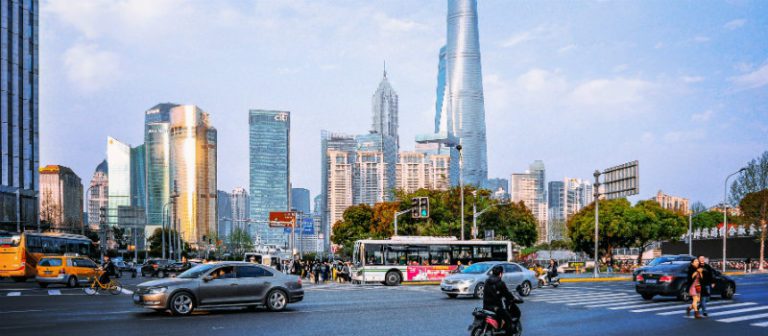Roads in the city of Shanghai
I got my driver’s license just days ago, at the age of 21. Many of my high school friends got theirs at the age of 18, the minimum legal age to drive in China. Thus, it’s a long-delayed milestone of adulthood for me.
My parents were thrilled. My mom told me that she felt it meant that I was finally “grown-up” and had my own agency. Meanwhile, my father sent me a “hongbao” (aka a red envelope) to celebrate.
For me, getting a driver’s permit meant freedom. Especially in my hometown with limited public transportation, being able to drive around greatly enhances my mobility.
I don’t have to spend two hours on the road just trying to hang out with my friends downtown. I also don’t have to bear the heat walking in the summertime.
Additionally, I’m one step closer to my childhood dream of traveling around the world on wheels with my family or best friends.
Meanwhile, the freedom of mobility brought by driving is not only physical but economic, social, and cultural in modern China.
What does it take to get a driver’s license?
I’m currently one of 400 million drivers in China. However, the process of obtaining a driver’s license in China is never easy.
Trainees must first register at a driving school and get lectured on relevant legislation. Then they have to pass four tests, two theoretical and two practical, to finally receive their permits.
The tests are especially tough for middle-aged or elderly people. Many fail several times since they haven’t taken exams for decades. My mom and my aunt both got their licenses in their forties after several tries.
A driving test facility in China
Normalizing car ownership in China: a sign of modernity
Despite the enormous time and money required, obtaining a driver’s license mostly ends up being worthwhile.
Born in a working-class family in the late 1960s, my aunt told me that when she was young she never imagined herself owning a car. Now she can drive to visit her adorable grandson, my nephew, in just thirty minutes. She can also travel to the outskirts of the city with her friends freely.
“My car brings me a lot of conveniences, satisfaction, and a sense of self-control,” she said.
My aunt’s account represents the experience of her generation. Over the past 30 years, the astonishing economic development of China has made private cars largely accessible to working-class people.
In 1996, a Volkswagen Jetta cost around $18,000 USD in China. This was 23 times the average yearly wage for Chinese people ($780 USD) that year. In 2020, a Volkswagen Jetta was priced at just $11,000 USD, while the average yearly wage rose dramatically to $13,000 USD.
Car ownership is convenient for family life
To some people, owning their own car means even more
Earlier this year, Su Min, a 56-year-old Chinese auntie, went on a solo road trip across China to escape from her abusive and unhappy marriage. The mainstream media recognized her as a “feminist icon” who resisted the patriarchy and gender stereotypes to embrace a life of personal liberty.
In her trendiest vlog, Su illustrated the significance of her private car, a Volkswagen Polo that served as the vessel of her solo trip.
Su bought the car with her pension and monetary assistance from her daughter. Thus, the car was particularly precious to her. Without economic prosperity and individual effort, Su might not have been able to fulfill her dream.
Su spends each night alone in her rooftop tent
Jun Zhang, a renowned anthropologist working at the City University of Hong Kong, wrote about the role of automobiles in modern China in her 2016 book “Driving toward Modernity: Cars and the Lives of the Middle Class in Contemporary China.”
For Zhang, private car ownership and the mobility that comes with it are a “sign of adulthood, a marker of citizenship, the basis of sociability and networking, and a metaphor of a burgeoning, modernized socialist Chinese state.”
However, driving can cause negative impacts
At the same time, the prosperity of the automobile industry also brings about challenges to society. It has transformed the urban landscape to work disproportionately for the middle class and the elite. People without cars have to bear with the congestion, noise and pollution.
More importantly, cars brings about enormous environmental costs because most automobiles run on fossil fuels. As climate change tightens its grip on human civilization, we must balance the need for modernization with sustainability.
Have you got your license yet? What do you think of the role of cars in modern society? Tell us in the comment section below!



I am almost 30 years and I never got my driver’s license! Mostly because I lived near everything, and I had bus lines conveniently stopping close to my house, so it was never a need. However, I moved to a completely different place, and everything is far away, and like you, it takes a long time to just go over there. I am still not interested in it, I guess I don’t care about driving although I do recognize the convenience. Now, a question: can anyone get a driver’s license in China? Including foreigners? Thank you for another great article!